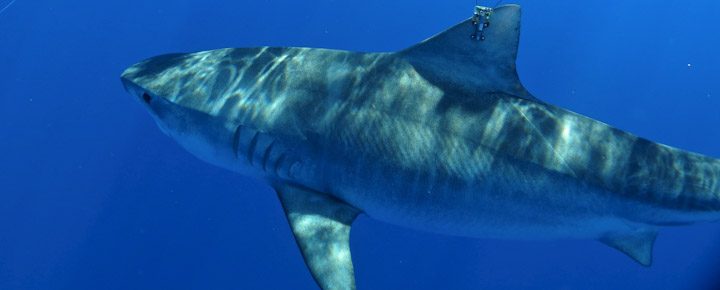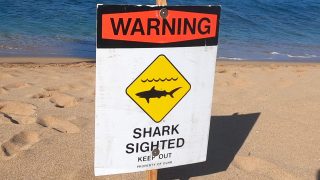Shark attacks are a rare yet genuine concern for those who enjoy swimming, snorkeling, surfing, and other water activities in Hawaii.
While the chances of being attacked by a shark are slim, how concerned should you be?
At the very least, it is important to be aware of the risks and take precautions to protect yourself while enjoying the beautiful waters of Hawaii. We are going to give you some ideas below on what to do. Sharks are back in the news after an unconfirmed attack this week on Maui with a missing snorkeler off Keawakapu Beach. The person was not found, and the rescue was called off.
Here’s what happened. A 60-year-old Washington state visitor and her husband were 225 feet off the beach at about noon when her husband reported sighting a large shark swimming in the water. He swam to shore and reported his wife had gone missing. US Coast Guard rescuers started looking for the woman with the help of Ocean Safety and the Maui Fire Department. The search continued for the remainder of Thursday and Friday. State DLNR confirmed that a 10-12 tiger shark was spotted in the area (they did not say by whom).
The identity of the woman and her husband have not been released, and shark warning signs have since been removed.
How frequent and deadly are Hawaii shark attacks?
According to the International Shark Attack File, the only scientifically documented, comprehensive database of all known shark attacks, including Hawaii, there have been a total of 152 shark attacks in Hawaii between 1828 and 2020, with a total of 17 fatalities. Most of these attacks have occurred on the islands of Oahu and Maui. However, shark attacks can occur at any beach in Hawaii, and it is important to be cautious no matter where you are.
Hawaii DLNR maintains a list of Hawaii shark incidents.
Several species of sharks can be found in Hawaiian waters, including tiger sharks, great white sharks, and hammerhead sharks. Tiger sharks are responsible for the majority of attacks in Hawaii and are known to be aggressive and curious omnivores. While the chances of being attacked by a shark in Hawaii are very low, it is nonetheless important to be aware of the risks and take steps to protect yourself and others while enjoying the beautiful waters of the islands.
To avoid Hawaii shark attacks, begin with some basic safety guidelines.
- First, avoid swimming or surfing near river mouths, as sharks are attracted to areas where there is an influx of nutrients from freshwater sources.
- Second, avoid swimming or surfing at dawn, dusk, or night, as these are the times when sharks are most active.
- Third, avoid wearing shiny jewelry or brightly colored clothing, as these can confuse and attract sharks.
- Finally, leave the water immediately if you see a shark (no problem!) and notify lifeguards or other authorities.
Shark bites in Hawaii.
There’s no aspect of shark behavior that is as interesting or terrifying as what DLNR calls “very rare occasions when sharks bite humans.” They add, “And when bites occur, they result in widespread attention, especially if injuries are serious or even fatal.”
Hawaii DLNR reminds us to keep these rare incidents in perspective since “The chances of being bitten by a shark are less than one in a million. The chances of being seriously injured by a shark are much less than that. But considering the tendency of some media to sensationalize sharks, and the fact that shark bites are such unusual events, it’s probably not surprising that when they occur, they often generate attention out of proportion to the risk itself.”
Tiger sharks in Hawaii and others.
Tiger sharks are most often responsible for Hawaii shark incidents which result in serious injury or death. They are considered one of the world’s three most dangerous sharks. Tiger sharks are of concern due to their size and the fact that they will eat almost anything. They’re open to eating things at the surface of the ocean. Some bites result from a shark determining if the object is food.
The others are white sharks, rarely found in Hawaii, and bull sharks, never found here.
Shark behavior remains minimally understood.
Studies about Hawaii shark behavior and attacks on humans continue, largely in conjunction with the International Shark Attack File (ISAF) at the University of Florida. Hawaii gathers information on shark incidents, which is submitted to ISAF for use in their database.
Should you fear shark attacks here in Hawaii? It’s unlikely you will experience a shark attack on your Hawaii vacation; the statistical odds are 1 in 11.5 million. And, while rare at Hawaii Beaches, it’s good to remember that shark sightings can occur anywhere in Hawaii.
There are nearly 40 species of sharks found in Hawaii, with a smaller group common near shore. The sharks that most people encounter are reef, sandbar, hammerhead, and tiger.
Follow Hawaii tiger sharks online.
UH Manoa marine biologists continue to track the movement of tiger sharks fitted with satellite transponders mounted on their dorsal fins. They seek better insights into tiger shark behavior and the habitat of these largely revered creatures. This video describes that work.
Sharks’ critical role in Hawaii.
Sharks are apex predators, and 1/3 of the species are in danger. Sharks have a critically important role in maintaining species under them in the ocean food chain and removing the sick and weak while helping balance diversity. Their presence is indicative of the health of our marine environment.
Native Hawaiians have highly revered sharks as family guardians (aumakua). These are considered ancestors who have been reincarnated as animal protectors of the family.
Photo credit: Mark Royer.







I keep reading to see if anyone else saw this woman before she went into the water. It is tragic if she lost her life this way but seems odd that the supposed shark left no remnant of her at all. Has it been proven that she was in the water for sure? Her husband is the only person saying this happened. They found part of a swimsuit and snorkel but nothing else. Seems fishy.
We all know shark attacks happen in Hawaii, but I immediately thought the same as you. Most shark attacks are not fatal and if they are, the shark will not completely devour a person or drag them out to deeper waters. Hawaii keeps track of shark attacks and I think this would be the first time a body was not recovered. Also, most snorkel gear would just sink to the bottom of the ocean and stay there. It’s seems a little too convenient to have her snorkel gear wash up to shore along with a piece of her swimsuit. I also would never snorkel separate from my wife and swim back to shore without her. I’m anxious to see how this story develops.
Hawaii Shark attack history:
dlnr.hawaii.gov/sharks/shark-incidents/incidents-list/
There was another shark attack just a few days later on the Big Island. More importantly, I did find this recent article that provides more detail, including mention of a witnesses seeing a shark feeding in red cloudy waters and eventually calling DLNR. The DLNR also asked people to stop posting conspiracy theories about the event. Very sad, this information seems to confirm a legitimate fatality.
mauinow.com/2022/12/16/investigations-into-maui-shark-incident-conclude-additional-information-shared/
The remarkable thing in this case is by those four criteria she was mitigating her risk: midday, not near a river mouth (and at a popular spot that my 6-year old and I snorkeled and paddleboarded in August), and headed for shore on sighting the shark. We don’t know if she was wearing bright or shiny clothing. The fatal surfer attack about 2 years ago at Honolua… that’s a creek mouth with some murkier nearshore water. Also a popular snorkel spot. I suppose the lesson is that it’s their world and we visit it.
I was snorkeling at the same spot same day with my sister, we got out around 11 am and went back to our place about 30 min before the shark attack We were staying at the condominiums next to the beach. We found out about the shark attack after seeing the rescue helicopter and other search activities in the water. The news of the attack was shocking. I feel sad for the lady who was apparently taken by the shark, and thankful the it was not me or my sister. After this trouble incident, I am not going snorkeling for a long time. Not even going to Hawaii for a long time.
She was not wearing anything bright and no jewelry. They were doing everything “right” (swimming at midday, not swimming alone, not swimming near a river mouth, water reasonably clear (they could easily see the bottom)). They were swimming about 50 yds out. He noticed her missing before he saw the shark. It was when he was looking for her that he then saw the shark (with blood coming out of its gills and mouth) and blood in the water. People on the beach were yelling. Someone on shore called 911, not him. He realized she was gone (eaten) based on what he saw in the water. I am 100 % certain of these facts because she was my friend and I was staying with them on Maui. The ocean is a wilderness with apex predators. Do your research. Peace.
I am so sorry for your loss. I have read about your friend a bit and she seems to have been an amazing woman who was living her best life when she was tragically taken. I wish healing to her husband and her loved ones. The media didn’t do a good job, at all, of accounting what happened. They should have said possible encounter and left out the specifics until they released full account. I kept looking for more information but they gave very few details. Unfortunately that leads to speculation which was mistaken. My apologies.
It was horrible and tragic. The authorities misreported many facts as well as were vague. Their initial reports were unacceptable and as you said left the door open for speculation and accusations. They knew from the very beginning that she was killed by a shark but continued to act as if she was missing. DNLR and police were on the beach and had eye witness accounts as well as physical evidence. It took them 8 days to finally say that a woman was killed by a shark on that beach. I can only assume that this is because of the tourist industries. I can think of no other reason. But it made our loss so much more complicated and difficult. Thank you for kind words and thoughts. Kristi was a beautiful soul and I will miss her terribly.
Despite the Infrequent Attacks upon Humans it still happened and no amount of Statistics will change that. It can, however, tell us When Attacks have occurred, that information could prove preventative. Coastal water temperatures play into this as proven on the Atlantic Seaboard through New York, warmer waters allow predatory sharks closer to shore and even up tributaries Despite being fresh water at some point. If we’re not going to learn from History, why bother recording it? Use the Data Sets!!!